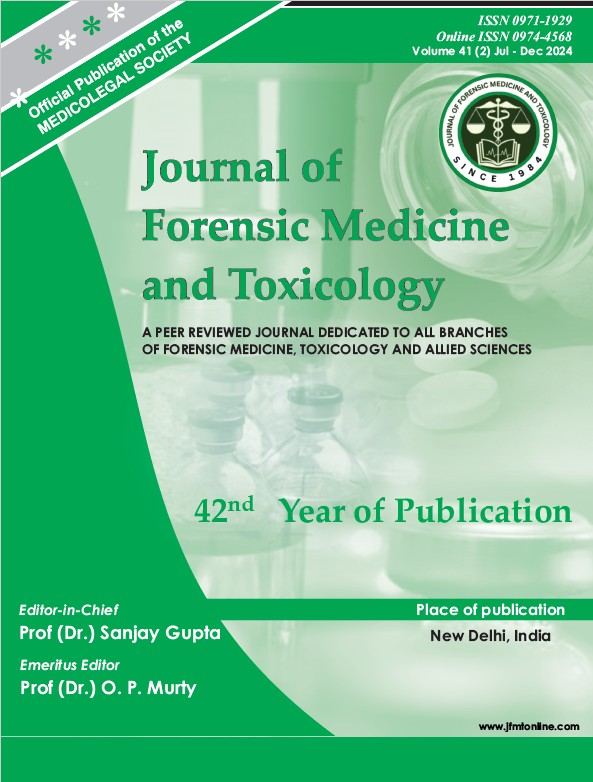Ethics and Stament
The Journal of Forensic Medicine & Toxicology
About
A peer-reviewed journal covered by Scopus, Embase, and the Excerpta Medica Database. (Official Publication of the Medicolegal Society)
PRINT ISSN: 0971-1929
ONLINE ISSN: 0974-4568
Email id: editor.jfmt@gmail.com
PUBLICATION ETHICS
Research and publication ethics: Medical research involving human subjects shall be conducted according to the World Medical Association Declaration of Helsinki. Adherence to the guideline given by Committee on Publication ethics (COPE), International Committee of Medical Journal Editors (ICMJE), World Association of Medical Editors (WAME) and ICMR guidelines is mandatory. Approval of Institutional Ethics Committee or Institutional Review Board is mandatory for original research work. For case report, case series, review article, short communication and letter to editor intimation to Institutional Ethics Committee or Institutional Review Board shall suffice the purpose and a statement with regards to same must be included in the “Materials and Methods” section of the article. The CTRI /IEC/HREC/Prospero number shall be mentioned depending on the type of study. Voluntariness, consent, protection of rights of participants, anonymity of the data is a complete and collective responsibility of the authors. Plagiarism shall be viewed seriously. ICMR guidelines (ICMR POLICY ON RESEARCH INTEGRITY AND PUBLICATION ETHICS, 2019) shall be taken into consideration before submitting the article for publication and appropriate disciplinary proceedings can be initiated as deemed necessary. The JFMT is dedicated to upholding the highest ethical standards at all stages of publication.
Some examples of publication misconduct, which are as follows:
- Plagiarism: It is the appropriation of another person's thoughts, ideas, data, figures, research methods, or words without giving appropriate credit, or the over-citation of another person's published work.
- Fabrication: It is the practice of making up data or results without having performed relevant research.
- Falsification: It is the practice of changing data or results intentionally such that misleading conclusion is drawn.
- Inappropriate Authorship: It means that authorship is not assigned based on the author's contributions.
- Duplicate Submission/ Multiple Submissions: It refers to the practice of submitting the same manuscript or several manuscripts with minor differences (e.g., differences only in title, keywords, abstract, author order, author affiliations, or a small amount of text) to two or more journals at the same time, or submitting to another journal within an agreed or stipulated period.
- Overlapping Publication: It refers to the practice of publishing a paper that overlaps substantially with one already published.
- Salami publication: It refers to the practice of slicing data from a large study, could have been reported in a single paper, into different pieces and publishing them in two or more articles, all of which cover the same population, methods, and question.
- Cross Checking references in connection with content.
Journal’s Policy Regarding Human Rights, Animal Rights and Informed Consent
This policy has been adopted to publish responsible research findings and to endure that all the necessary approvals and consents have been obtained prior to publication of the outcomes. Authors need to testify that their research has been carried out in accordance with the procedure approved by the respective ethical committees of their organizations. The Editor of the journal takes the final decision on the acceptance and rejection of the manuscript that are subjected to scrutiny of issues regarding human and animal ethics. Clinical research/trials involving human data, human specimens and human subjects must have been performed in accordance with Helsinki Declaration of the World Medical Association in 1975 as revised in 2008 concerning Human and Animal Rights under the approval of ethics committee. Justification of the clinical procedure followed may have to be furnished if required by the editor or peer reviewer. Authors are expected to secure informed consent for participation in the study by the human subjects. The experimental procedure and the outcomes involving animal models must comply with the National or International guidelines. Manuscript must include the details (guidelines/permissions/licenses) of such compliance with appropriate references and specifications.




